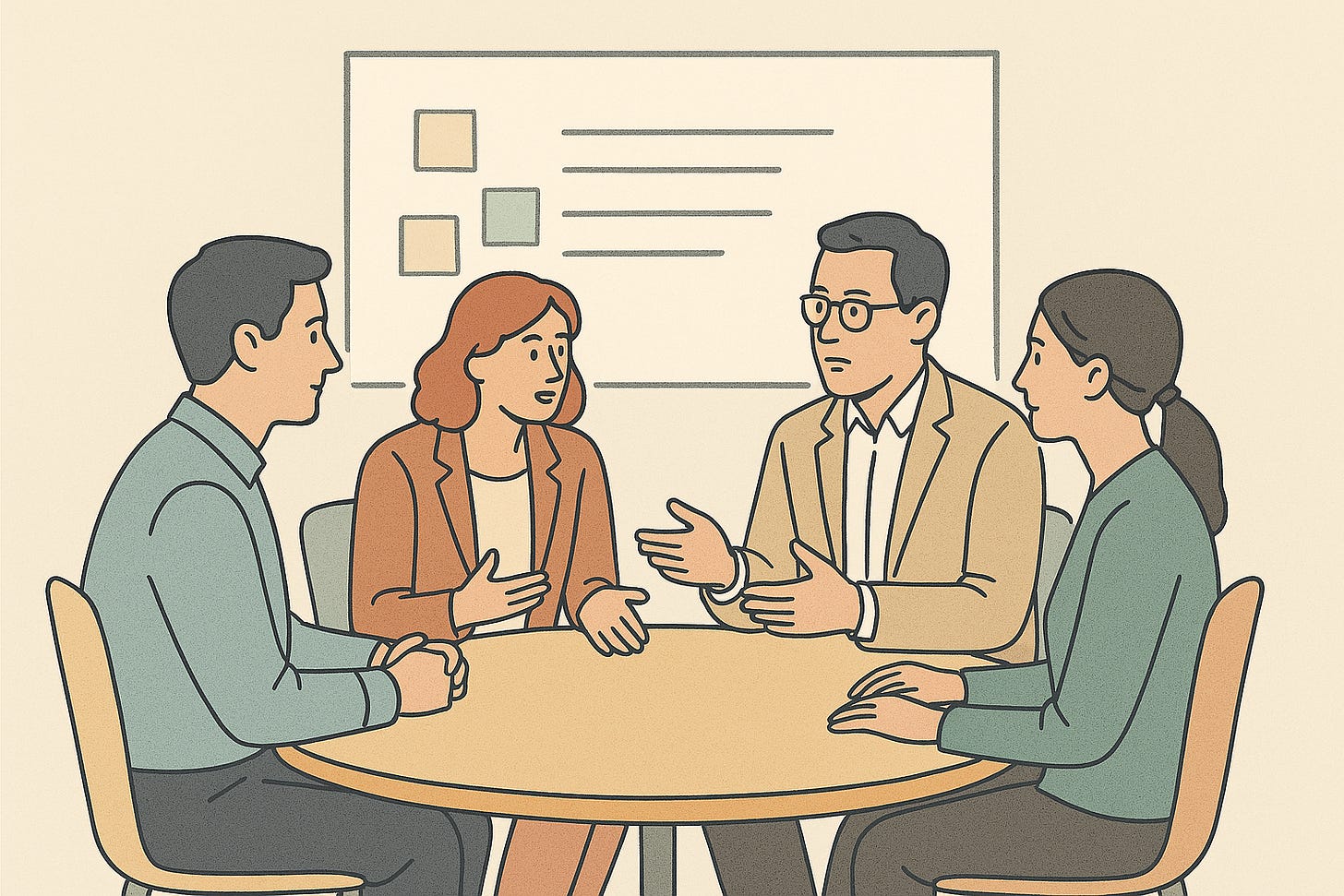Finding Dialogue in complex organisations
Focus on collaborating for systemic sustainable changes, even in times of AI
David Bohm, a pioneering quantum theorist, worked to define a working methodology based on “dialogue” which he defined as when a group “becomes open to the flow of a larger organization”.
From Greek διάλογος (dialogos)
• διά- (dia) = through, across, or between
• λόγος (logos) = speech, discourse, reason, or word
Essentially a flow of words.
“In practical terms, this means a group of people speaking together not to win an argument, but to uncover deeper truths — suspending judgment, listening actively, and surfacing hidden assumptions together.”
Dialogue feels natural, yet it is surprisingly difficult to practice consistently and intentionally. This challenge arises from the collective nature of dialogue which requires coordinating multiple minds and that adds complexity.
Entering a dialogue requires accepting certain ground rules. I’ve found that it can be useful to start from the Basic Assumption stated in this lesson from the “Introduction to System Dynamics” lesson:
“We believe that everyone in this class is intelligent, capable, cares about doing their best and wants to learn.
This Basic Assumption is the foundation for proper dialogue among people. Dialogue requires surfacing assumptions and acknowledging knowledge gaps in the open so that everybody can learn from these and build a better understanding on top of it. A class is obviously the standard place where the goal of the group is learning.
Purpose
Dialogue is a critical activity to enable systems thinking by allowing to see each other's mental models without having to defend any of them but engage in a sharing of ideas that allows to do self introspection (evaluate the ways each one of us sees the reality) and a collective introspection of what are the actual and shared mental models in reality (what the group believes it’s the reality).
Seeing and exposing mental models helps reveal hidden or unexpressed assumptions that hide untapped potential. The gaps in collective knowledge that nobody publicly addresses but affect everybody.
Kind of like a closed door you never dared to open. Where will it take?
Dialogue, talking with each other, in the right context is the best solution. It doesn’t mean that dialogue is the only way of communication but the organization should learn to actively engage and leverage the power of dialogue, especially in a creative process.
Psychological Safety
Guaranteeing the Basic Assumption requires clearly a high level of psychological safety in the group. Without it, no proper dialogue can occur because there will be certain assumptions or decisions not shared explicitly and that cannot be challenged, limiting the systemic impact of any decision originated from the dialogue.
An organization that is based on such an assumption allows each individual to be at their best, supporting and developing personal mastery of each individual and the organization’s mastery as a whole.
Imagine starting your meetings with this as a core shared assumption. Then a dialogue is the only reasonable way of communicating between peers. For a world to work like this it may take centuries to happen, but an organization could have this in a shorter time frame if the energy is applied in the right places.
In order to achieve such a level of collaboration, it helps to have the right leverage. A shared and clear vision could fuel such organizational change. A vision could be a starting point for a change that puts dialogue at the centre of the organization’s process.
Whatever the leverage is, maintaining (or just achieving) good levels of dialogue represents a big change. It’s then a muscle that must be trained, carefully and constantly. It is not innate but must be cultivated.
It is a commitment to personal and collective mastery, an intimate human desire to achieve the sense of purposefulness.
Dialogue and AI: The Next Frontier?
Is dialogue an oral thing only? Predominantly. I wouldn’t know how to reproduce it in a written way; the closest would be a text chat. But I don’t know how much the delay in response influences the flow.
One could even imagine this with an AI agent. But then if we talk to an AI, will the knowledge grow for both the human and the AI at the end of the dialogue? Or will the AI forget this? Maybe it grows (stored information) but will it develop? By developing I mean, will it affect the future reasoning of the AI similarly to how that dialogue could shape the future mental models of the human?
An AI that does not gain insights from conversation loses one key aspect. Learning happens when there is the change in our current understanding of reality, when we update our mental models.
An AI that can dialogue could be critical in a learning organization since it enables continuous development and definition of the mental models controlling the organization’s behavior and therefore drive effective and sustainable changes.
Looking at the whole
Any development of these AI capabilities must be considered in terms of the organization’s development. We must create a sustainable development with the reference of the system composed of:
people
finance
environment (includes AI)
In particular it remains important to guarantee people’s development even in times of AI, if nothing else to mitigate the damage from AI hallucinations or fill in contextual information AI agents may not be able to access or understand. This contextual information may be the key to discover untapped potential.
If AI does not learn to challenge assumptions, people will have to learn to do it and have a way to navigate the complexity and large amount of conflicting information.
References
I’ve found the book “The Fifth Discipline” to be an eye opener for me on how much untapped potential there is in most organizations and how learning to leverage it by applying systems thinking methodologies could untap unexpected capabilities in an organization. The practice of dialogue is one of the many the book goes into great detail articulating.



